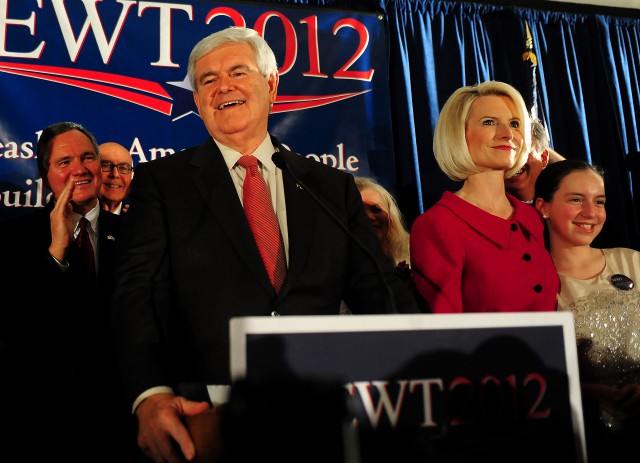
COLUMBIA, S.C.—South Carolina. Republicans are frustrated, and it showed Saturday.
Frustrated with a sluggish economy that won’t reverse course.
Frustrated with the related stubborn 9.9 percent unemployment rate.
And hopping mad with a federal government that, they
say, has broken faith with the American people by running up huge debts
and stripping states of their legitimate rights under the Constitution.
Republican voters statewide found a mouthpiece for
their anger Saturday in Newt Gingrich, overwhelmingly handing him a
primary victory after he dominated two well-watched debates in the
crucial last days before the primary.
The former speaker of the U.S. House used the debates
to launch a fiery attack on the media, Washington and his chief
Republican rival, Mitt Romney, finding a kindred spirit with S.C.
Republicans disillusioned by the economy and Democratic President Barack
Obama. With a series of debate one-liners, Gingrich convinced those
voters had the brains and the guts to go toe-to-toe with Obama in
November.
“It’s time for a bulldog president,” said Rema
Thomas, 60, of Chapin who decided to vote for Gingrich after watching
the two S.C. debates. “Grab ’em by the pants leg and don’t let go until
you draw blood.
“That’s Newt.”
Debate performance never mattered more.
Gingrich received a standing ovation during Monday’s
Myrtle Beach debate for saying he would teach the poor to work. And he
brought a Charleston crowd to its feet during the first five minutes of
the start of Thursday’s debate, turning a question about his
relationship with his ex-wife into an assault on the media.
“One of the worst things in this country is the
media,” said Steve Chase, 61, of Chapin, who cast a vote for Gingrich
Saturday. “They have an agenda. And (Gingrich) is the only one, probably
since Reagan, who stands up to them.”
Front-runner Romney may have had the cash,
outspending Gingrich in the Palmetto State by nearly 2-1, and the air of
inevitability, but he failed to galvanize the GOP base and proved to be
lackluster in the debates, losing his train of thought and stumbling
over whether he would release his tax records.
All in all, it was a bad week for Romney, who was
assailed for his role as a venture capitalist at Bain Capital, his
offshoring of money in the Cayman Islands and had his Iowa win reversed
by a recount that found former U.S. Sen. Rick Santorum of Pennsylvania
the winner.
In the end, Romney won the largest number of voters
only among the rich, those earning $200,000 or more; the very
well-educated, those with post-graduate degrees; those who call
themselves moderates; and non-evangelicals in Saturday’s primary,
according to exit polling.
“Romney is one of the 1 percent,” said Chester Woodward of Columbia, who cast a vote for Gingrich. “But he tries to hide it.”
Gingrich won the largest number of voters given any
single candidate in every other category, taking the familiar S.C.
geographic map — where the most conservative candidate takes the Upstate
while the established one wins the coast — and turning it on its ear.
Gingrich won all but three of the state’s 46
counties, losing only Beaufort, Charleston and Richland counties —
urban, more educated and relatively more prosperous.
”We’re used to seeing the state’s geographic map
looking like a half-empty glass of milk,” said Shell Suber, an S.C.
political consultant. “No more.”
During the 11th hour before the primary, Gingrich
closed the deal with crucial blocs of voters, including evangelicals and
tea party members.
Speculation ran high Gingrich’s three marriages and
admissions of extramarital affairs would doom him in a
socially-conservative state, where evangelicals made up 65 percent of
Saturday’s primary voters.
None of it made a shred of difference to evangelical
voters, including Chapin’s Thomas, who brushed aside Gingrich’s personal
problems to pull the lever for the candidate she thinks will shake up
Washington.
“No one does not have personal baggage. Newt’s was just exposed more because of his time in politics,” she said.
In the last days of the primary, Gingrich also shored
up his support with the state’s once-fractured Tea Party groups.
Saturday, Gingrich led Romney 2-1 among voters who strongly supported
the Tea Party.
Perhaps the biggest Saturday surprise was S.C. voters
turning their backs on the establishment candidate — the one they
traditionally have picked — in favor of the firebrand Gingrich.
“This is a huge break,” Suber said. Suber said the
first indication that S.C. politics was becoming more emotion-based came
in the 2010 governor’s race, when now-Gov. Nikki Haley came from behind
against three better-known, better-funded GOP primary opponents to
sweep the election at the last minute.
“Before then, there had always been a sobering effect
in the last couple of days before a primary among voters, that we pick
the one who has the best chance of getting the (nomination), that
electability mattered above all else,” Suber said. “This time, voters
said, ‘This guy, Newt, is saying what I want to hear. I love what he’s
saying and that’s what matters most.’ ”
It is too early to say whether the S.C. GOP’s new way
of picking primary winners will affect the state’s status as a litmus
test for the national Republican Party. Since 1980, S.C. GOP voters
correctly have picked the candidate who went on to win the nomination.
“We won’t know if we lose our title until we know who
the nominee is going to be,” Suber said. “If Gingrich doesn’t (win the
GOP nomination), we’ve broken our streak since 1980 and we need to
wonder if the state’s primary climate has grown to a level where emotion
weighs more than logic.”
___
%uFFFD2012 The State (Columbia, S.C.)
Visit The State (Columbia, S.C.) at www.thestate.com
Distributed by MCT Information Services














